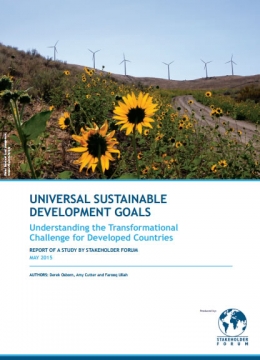Universal Sustainable Development Goals: Understanding the Transformational Challenge for Developed Countries
Year:
2015
Publisher:
STAKEHOLDER FORUM
The Sustainable Development Goals (SDGs) are intended to be universal in the sense of embodying a universally shared common global vision of progress towards a safe, just and sustainable space for all human beings to thrive on the planet. They reflect the moral principles that no-one and no country should be left behind, and that everyone and every country should be regarded as having a common responsibility for playing their part in delivering the global vision. In general terms, all of the goals have therefore been conceived as applying both as ambitions and as challenges to all countries. All of the goals and targets contain important messages and challenges for developed and developing countries alike.
The different goals and targets will however represent different degrees of challenge and ambition for different countries depending on their present state of development and other national circumstances. So when it comes to implementation different countries will need to give different degrees of attention and effort to the different goals and targets, depending on where they stand in relation to them at present, their differentiated responsibilities and their different capabilities and resources. The balance between the social, economic and political effort needed to deliver the different objectives is also likely to be different in different countries.
Much of the international discussion in the formation of the SDGs has naturally and rightly concentrated on the pressing development needs of the developing countries and the support they will need from more developed countries and the international community in achieving the goals. Some of the individual goals and targets have been particularly shaped and calibrated to express the needs and aspirations of developing countries; and others express the responsibilities of the developed world to assist the development process in the developing world.
From the outset it has also been intended that the SDGs should also express the sustainability challenges facing the developed world in their own countries. But so far less attention has been paid to this aspect of the SDGs and the ways in which they represent a fundamental challenge to the more developed countries (and increasingly the middle income countries as well) to transform their own domestic economies in a more sustainable direction. This report offers a preliminary analysis of that radical challenge to the more developed world and some of the key elements in it.
This study proposes a new method of analysis of the goals and targets to assist in identifying those which will represent for developed countries the biggest transformational challenges, in the sense of requiring new economic paradigms and changes in patterns of behaviour as well as new policies and commitment of resources. In our initial analysis, the methodology identifies the goals of sustainable consumption and production (SDG 12), sustainable energy (SDG 7) and combating climate change (SDG 13) as the three most transformational challenges facing developed countries – and as being the challenges on which the world at large needs to see the developed world place a strong emphasis for action so as to relieve the overall anthropogenic pressures on the planet and its natural systems. Other goals involving significant transformational change in developed countries include the need to achieve more sustainable economies and growth pathways, the goal of greater equality, and the goals to achieve better protection of the oceans and of terrestrial ecosystems.
Social problems of poverty, health, education and gender issues are, of course, still present in developed countries as well as in developing countries (though to differing degrees) as are all the other issues covered by the SDGs. And the universal applicability of the SDGs stresses to the need to continue to confront all of these issues comprehensively in all countries. But further progress on these issues in the developed world cannot be expected to have such a large, transformational effect either within those countries themselves or in its impact on the rest of the world. Developed countries also need to continue to assist the development process in developing countries, particularly the least developed countries and to deliver on their long-standing pledges to commit 0.7% of their Gross National Income (GNI) to official development assistance programmes. But the attention which the SDGs and the international development agenda rightly place on this responsibility of the developed world should not divert attention from the equally important responsibility of the developed world to reduce the footprint and impact they impose on the rest of the world through unsustainable patterns of consumption and production and lifestyles.
The report suggests that the method of analysis it employs should now be used more widely to explore more deeply the major transformational challenges which the SDGs present to developed countries, as they begin to plan their SDG implementation strategies. It could also be applied to help other countries or groups of countries to identify the major transformational challenges which the SDGs imply for them.
Reference URL:
Work regions:
Publication Type:
Publication language:
English

Files:
